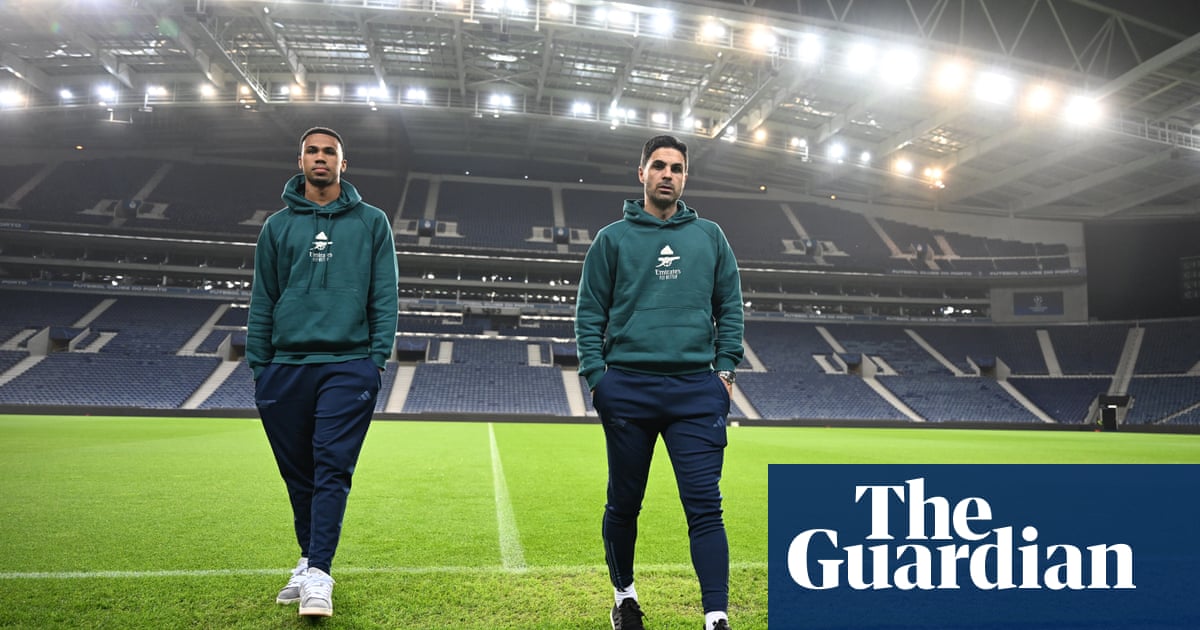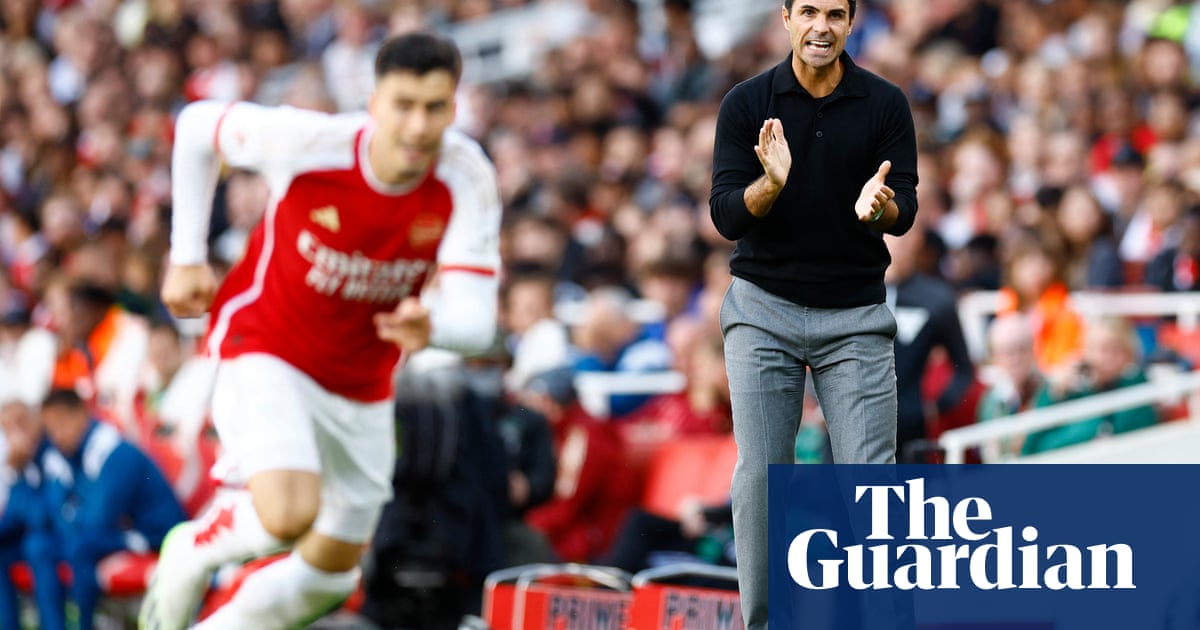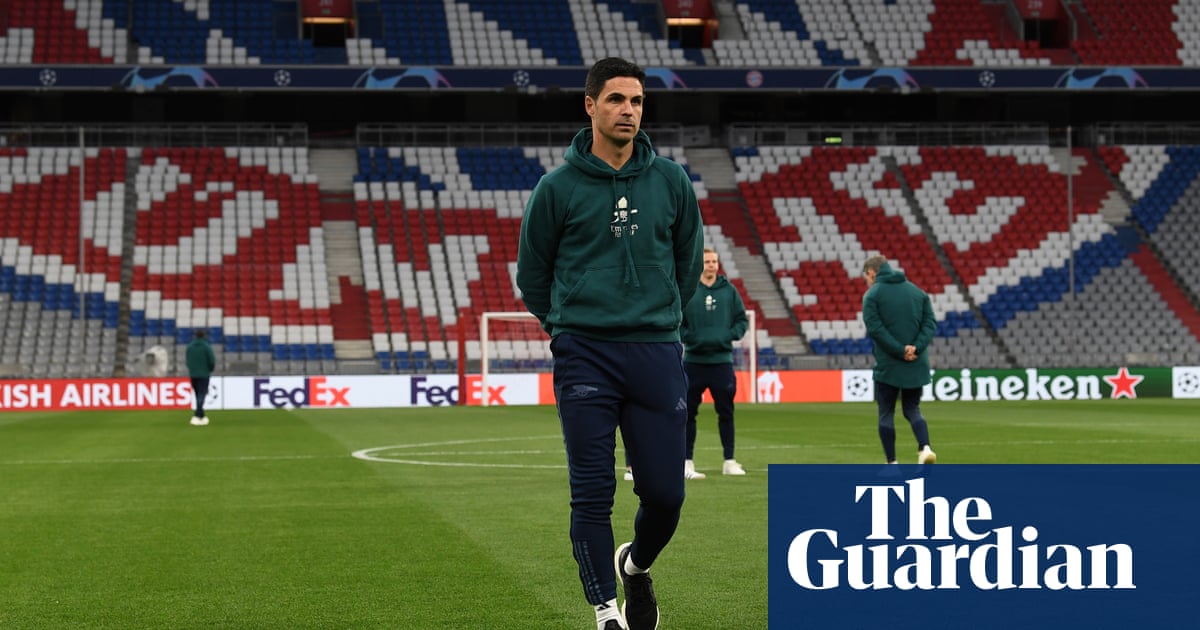
he refrain has become familiar, even exhausting. Since mid-February every week in the life of Arsenal has been laced with the same jeopardy: the sense that, should things go awry, the season will lie in tatters and Mikel Arteta will be forced to continue his rebuild on an emaciating diet of crumbs.
Nothing has changed over the international break. Arsenal return to the regimen of what Arteta has willingly come to term “finals” and, should they manage to negotiate each length of tightrope, it will remain that way until late May. Defeating Liverpool at the Emirates Stadium on Saturday night appears mandatory if any heat is to be kept on the top flight’s European spots; avoiding a first-leg headache against Slavia Prague five days later would bring them within three games of a genuine Europa League final in Gdansk and a chance to render all that domestic hassle unnecessary.
Fall short in both and the cold, pale backdrop to which Arsenal played most of their football in autumn and early winter will quickly return. Since then they have often threatened brilliance and occasionally produced it, but now it needs to become a hallmark.
Arteta wants to see the team that, galvanised by Martin Ødegaard, roared back at West Ham rather than the one that could not handle half an hour’s attacking intent from the hosts; he requires the players who outclassed Spurs for 80 minutes, and not the ones who came off feeling fortunate to have scraped through against 10 men. Arsenal are neither poor enough to lambast nor sufficiently accomplished to hail from the rooftops: in essence, they have to make a leap to the latter over the next eight weeks.
Arteta is about to find out who can handle the pressure. Of his regular starters there are, perhaps, six who would inspire his unflinching long-term trust: Kieran Tierney, Thomas Partey, Bukayo Saka, Emile Smith Rowe, Ødegaard and, while the ageing captain’s best deployment is a conundrum in itself, Pierre-Emerick Aubameyang. It is possible Gabriel Magalhães deserves a place on that list but, beyond these names, all bets are off. The spine looks sound and, especially if Ødegaard can somehow be secured from Real Madrid for another season or longer, as vibrant as most in the current top six. But it is not outlandish to suggest half of the team’s destinies are up in the air and anyone who fails to deliver risks a closeup of their manager’s unsentimental side.
“In some cases we’ve decided; in other cases there are things still to be decided,” Arteta said on Thursday when asked how many questions over his squad’s futures had been resolved. There are some easy ones: loanees such as Ainsley Maitland-Niles, Sead Kolasinac, Matteo Guendouzi and Lucas Torreira, along with the rarely seen Reiss Nelson, will surely be seeking fresh starts elsewhere.
The real posers lie among those closer to the action. Is Dani Ceballos, a decent player and character who has failed to stamp his authority on games, worth pursuing beyond his second year’s loan from Madrid? How does Arteta make sense of a central defence overstocked with options that are, by and large, a notch above mediocre and usually marshalled by a 33-year-old David Luiz, whose expensive contract soon expires? Are the rumblings suggesting Héctor Bellerín is amenable to a new challenge conducive to a friendly parting of ways and a useful transfer fee? Does Granit Xhaka have it in him to stay relevant as Arteta’s project evolves? Would proper competition improve Bernd Leno’s form or nudge him out?
Then there is the question of Alexandre Lacazette. Like Arsenal, the Frenchman is capable of delighting and exasperating in turn. He has recently been closer to the former but is still not a guaranteed starter; his contract expires in 15 months and, given his next deal will be the last major one of his career, a renewal will not come cheap. The fact discussions are yet to get under way suggests the wind is blowing in a certain direction but it would not take a huge leap to imagine Lacazette being the scorer who, against most odds, sealed Champions League football for Arsenal. It is a particularly sensitive issue given Eddie Nketiah’s days seem numbered and, even if Folarin Balogun signs new terms, the 19-year-old has not played a minute of Premier League football.
Every element of success achieved now reduces the stakes behind each of Arteta’s summer decisions. Arsenal announced a loss of £47.8m last month and that figure took in only the early weeks of the pandemic; next season’s outlook will be much bleaker if European football cannot be secured and underperforming players need moving on.
“We know what we want to do, we’ve got a plan that we’ll put together and we know there are certain scenarios that can vary [and] we can’t really control,” Arteta said of his pre-season transfer intentions. “They’ll be dependent on things that today we can’t really determine.”
His last sentence was intended to reflect the wildly different turns this season could yet take, but rang true in another way too. Nobody quite knows whether Arteta’s players are capable of clicking against a spluttery Liverpool before purring their way through a league run-in that, a visit to Chelsea aside, is the envy of their peers. Some are playing for their careers; Arsenal face a series of shootouts for their immediate future at the top level and the margin for error has virtually disappeared for everyone involved.












